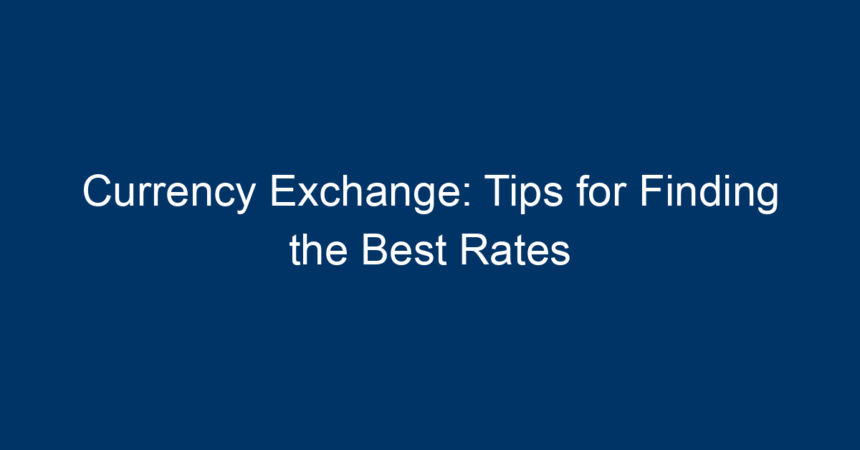When traveling abroad or engaging in international trade, understanding currency exchange rates is vital for optimizing your finances. The difference between a good exchange rate and a poor one can significantly affect how much native currency you receive and, ultimately, your purchasing power. This guide provides you with essential tips on how to find the best rates and make informed currency exchange decisions.
Understanding Currency Exchange
What is Currency Exchange?
Currency exchange refers to the process of converting one currency into another. It is a fundamental function in global finance, allowing businesses and travelers to conduct transactions across borders. Exchange rates fluctuate regularly due to various factors, including economic indicators, market sentiment, and geopolitical events.
Why Does It Matter?
Getting the best currency exchange rate is crucial for several reasons:
- Cost Efficiency: A slight difference in rates can lead to substantial savings, especially when exchanging large amounts.
- Budget Management: Understanding how to get the best rates allows for better planning and allocation of your budget during travel or trade.
- Avoiding Hidden Fees: Many currency exchange services charge hidden fees which can dilute your total received currency. Knowing how to spot these can save you money.
Key Factors Influencing Currency Exchange Rates
Economic Indicators
Economic indicators, such as inflation, interest rates, and employment data, play a massive role in determining exchange rates. For instance, high inflation in a country typically leads to depreciation of its currency, affecting the exchange rate unfavorably.
Political Stability
Political stability can greatly influence currency exchange rates. A country with a stable government is more attractive to foreign investors, thereby strengthening its currency. In contrast, political unrest can lead to currency depreciation, presenting opportunities for strategic exchanges.
Market Speculation
Traders often speculate on currency movements, which can cause short-term fluctuations in exchange rates. Keeping an eye on trends and forecasts in the foreign exchange market can help you time your exchange better.
Tips for Finding the Best Currency Exchange Rates
Compare Multiple Sources
One of the best ways to find favorable currency exchange rates is to compare various exchange services. Here are a few options:
- Banks: While they may offer more secure transactions, banks often charge higher fees. It’s best to check their rates and compare them with others.
- Currency Exchange Bureaus: These can offer competitive rates, especially in tourist hotspots. However, be cautious of hidden fees.
- Online Currency Exchange Platforms: Websites and apps provide real-time exchange rates and allow users to compare various services instantly.
Leverage Online Tools and Resources
Many financial websites and apps offer real-time exchange rates and currency converters. These tools help you stay updated on the current rates, allowing for timely decisions.
- Exchange Rate Alerts: Utilize apps that allow you to set alerts for desired rates, so you won’t miss a good exchange opportunity.
- Charts and Historical Data: Use charts and historical data to understand trends and plan your exchanges strategically.
Timing is Everything
Exchange rates can vary greatly from day to day. Monitoring trends over a period can give you insights into the best time to make your exchange. Here are strategies to consider:
- Watch the Market: Keep an eye on market news and economic data releases which can affect exchange rates.
- Avoid Weekends and Holidays: Exchange rates can be less favorable during weekends and holidays when foreign exchange markets are closed.
Understand and Avoid Hidden Fees
Many currency exchange services impose hidden fees that can drastically affect the effective exchange rate. Here are some tips to identify and avoid them:
- Check Breakdown of Fees: Always ask for a complete breakdown of fees involved in the exchange transaction.
- Read the Fine Print: Terms and conditions often include fees that may not be visible at first glance.
Choose the Right Type of Currency Exchange
Currency Exchange at ATMs
Using ATMs abroad can sometimes yield better exchange rates compared to currency exchange bureaus. However, be aware of the fees your bank may charge for international transactions. Here’s how to maximize your ATM withdrawals:
- Use Bank ATMs: Opt for ATMs owned by banks to minimize fees.
- Choose to be Charged in the Local Currency: When making a withdrawal, always select the option to be charged in the local currency rather than your home currency.
Prepaid Currency Exchange Cards
Prepaid currency exchange cards allow you to load money in different currencies before your travel. This can sometimes offer better exchange rates and reduced fees:
- Lock in Exchange Rates: Prepaid cards let you lock in a rate before traveling, protecting you from fluctuations.
- Cash Withdrawal: You can use these cards for withdrawals at ATMs and purchases, providing flexibility.
Avoid Currency Exchange at Airports
Exchanging money at airports typically yields the worst rates due to the higher fees charged by airport exchange services. Unless absolutely necessary, try to avoid this option.
Additional Best Practices for Currency Exchange
Keep Currency Diversity
It’s wise to carry multiple types of payment methods, including cash, cards, and digital wallets. This will give you flexibility based on the situation and potentially lead to better rates.
Stay Informed
Continuously educate yourself about currency exchange by reading articles, forums, and financial news. Being informed will empower you to make better decisions and avoid pitfalls.
Use Local Banks When Possible
If you find yourself needing to exchange currency while abroad, look for local banks rather than standalone currency exchange services. Local banks typically provide better exchange rates and lower fees.
Conclusion
Finding the best currency exchange rates is a vital skill whether you’re traveling or engaging in international business. By understanding the factors that influence rates and employing strategic approaches to currency exchange, you can maximize your financial outcomes.
Remember to compare different sources, leverage technology, and be mindful of hidden fees. With these tips, you’ll be better prepared to make informed currency exchange decisions that help you save money and enhance your purchasing power on your travels.
Actionable Insights
- Start comparing rates today: Use apps and websites to find real-time rates.
- Stay updated: Set alerts for desired exchange rates.
- Plan strategically: Monitor the market and find the best times to exchange.
Taking action on these insights will ensure you find the best currency exchange rates and make the most of your finances in a globalized world. Happy travels and savvy exchanges!



